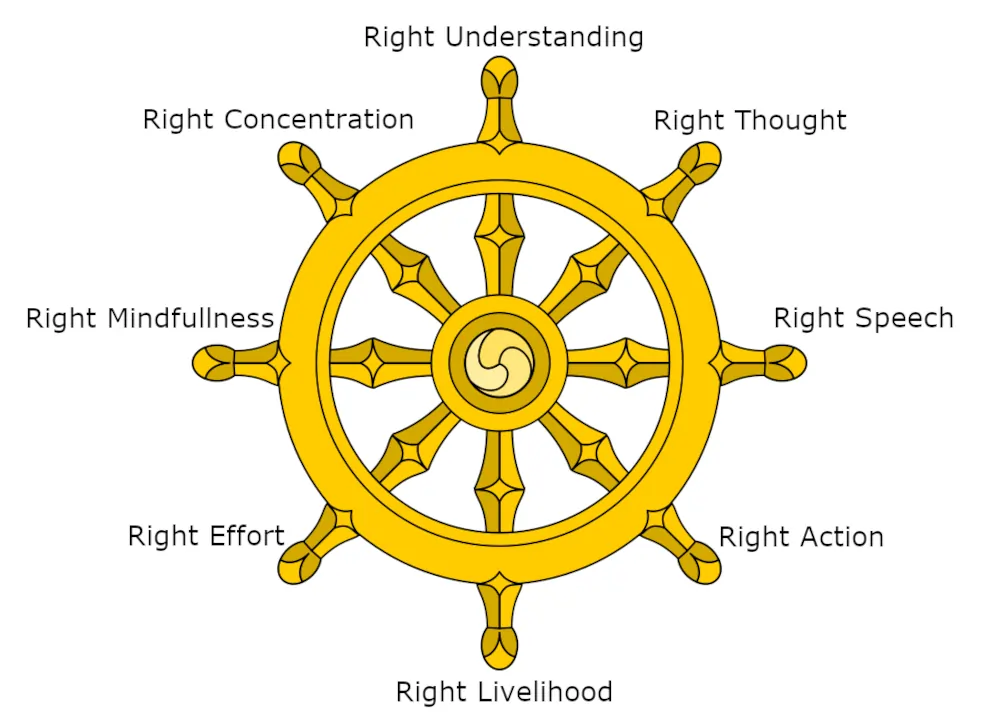Introduction: The Essence of Buddhism
At the heart of Buddhism lies the Noble Eightfold Path, also known as The Middle Path. This foundational framework isn’t just a set of guidelines but a rich tapestry of principles that lead to a life of balance, understanding, and enlightenment. Each step on this path is a building block for personal and spiritual development, aiming to foster a deeper connection with oneself and the world.
1. The Insight of Right Understanding
Right Understanding is the first step, emphasizing the importance of perceiving life realistically. This principle encourages seeing beyond illusions and misconceptions, guiding one to grasp the Four Noble Truths of Buddhism. It’s about recognizing the true nature of life, suffering, and the path to overcoming it.
2. The Power of Right Thought
Right Thought follows, advocating for mental clarity and positive thinking. This step focuses on developing thoughts that are kind and don’t intend to hurt others. It’s a journey towards cultivating a mindset contributing to inner peace and outward compassion.
3. The Harmony of Right Speech
Next is Right Speech, a principle that underscores the value of truthfulness and kindness in our words. It’s a commitment to avoid lying, harsh language, and pointless gossip. This aspect of the path teaches the impact of our words and the importance of using them responsibly.
4. The Integrity of Right Action
Right Action is about ethical conduct. It means refraining from acts that cause harm, such as taking a life, stealing, or engaging in dishonest practices. This step calls to live a life of integrity and respect for others.
5. The Ethical Foundation of Right Livelihood
Right Livelihood is about picking a job that is good and doesn’t hurt others. It means not working in businesses that sell weapons, alcohol, or poisons. This idea shows how our choices at work affect not just us, but also the larger world around us.
6. The Discipline of Right Effort
Right Effort is about mental discipline. It involves actively avoiding and eliminating negative thoughts and emotions. This step is crucial for maintaining a healthy and positive state of mind.
7. The Clarity of Right Mindfulness
Right Mindfulness is about being acutely aware of one’s thoughts, feelings, and physical state. This self-awareness leads to a deeper understanding of oneself and a more harmonious existence.
8. The Tranquility of Right Concentration
Finally, Right Concentration involves meditating to achieve deep calmness and a greater sense of awareness. This part is all about learning to focus your mind and be mentally steady, which leads to feeling very peaceful and gaining deep understanding.
Conclusion: The Path to Enlightenment
The Noble Eightfold Path of Buddhism offers a profound and timeless blueprint for living a life of balance, ethical conduct, and spiritual depth. Each of the eight steps – Right Understanding, Right Thought, Right Speech, Right Action, Right Livelihood, Right Effort, Right Mindfulness, and Right Concentration – provides a stepping stone toward inner peace and enlightenment. This path encourages a harmonious existence, fostering a deep connection with oneself and the surrounding world. By embracing these principles, individuals embark on a transformative journey, leading to a more mindful, compassionate, and insightful way of life.
Reference
- Four Novel Truths, Dan Shobha Tuladhar, Dipankar Tuladhar, 2017

